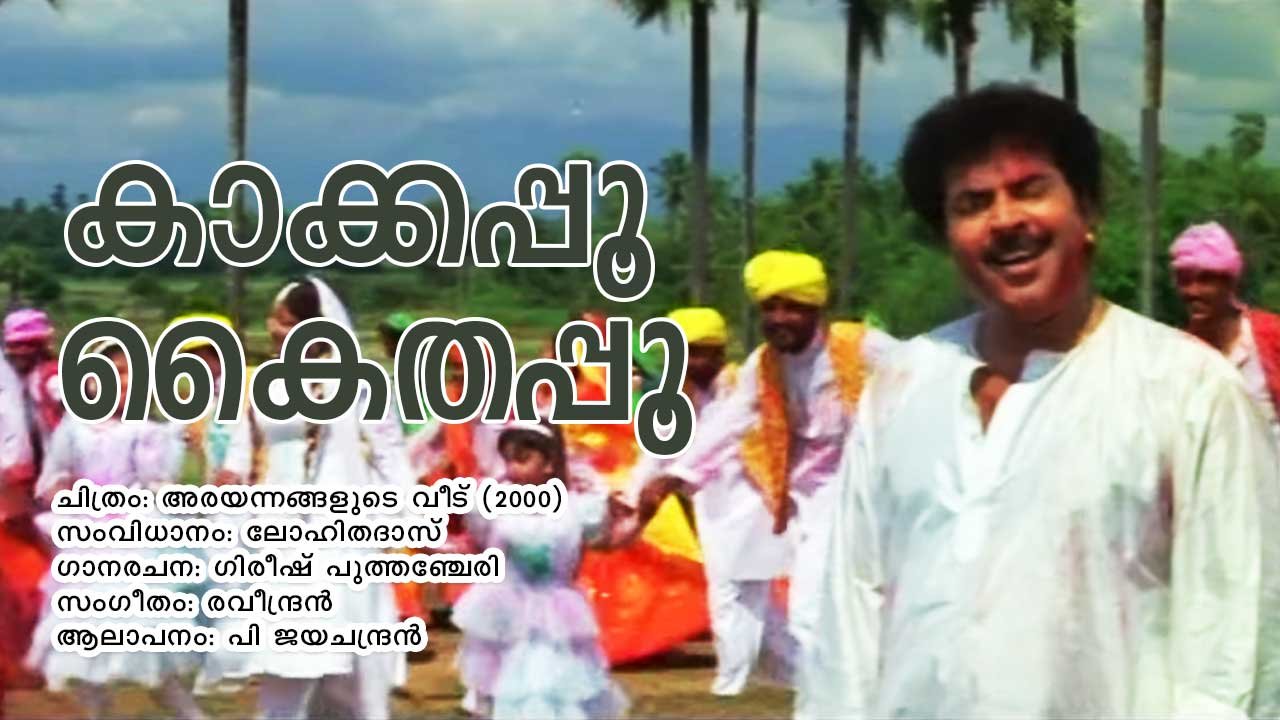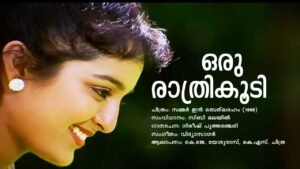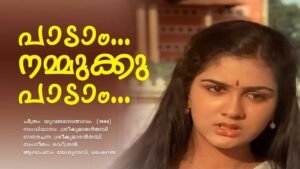Kaakkappoo Kaithappoo – Lyrics in Malayalam
ഹേ… ഹാ…
ആയീരേ ഹോളീ ആയീരേ
രംഗോം കീ ബാരിശ് ലായീ രേ
ജീവൻ മെ ഖുശിയാ ലായീ ഹോളീ
ദിൽ സേ അബ് ദിൽകോ മിലാ ദേ
ദുനിയാ രംഗീനു ബനാ ദേ
സബ് മിൽകേ ഹോളീ ഖേലേംഗേ
ഹോളീ, ഹോളീ ആയീ, ഹോളീ ആയീ
ഹോളീ, ഹോളീ ആയീ, ഹോളീ ആയീ
കാക്കപ്പൂ, കൈതപ്പൂ, കന്നിപ്പൂ, കരയാമ്പൂ,
കൊന്നപ്പൂ പൂക്കുന്ന നാട്ടിൽ, ഓ…
പൊന്നാര്യൻ കൊയ്യുന്നോരെന്റെ നാട്ടിൽ
കൊന്നപ്പൂ പൂക്കുന്ന നാട്ടിൽ,
പൊന്നാര്യൻ കൊയ്യുന്നോരെന്റെ നാട്ടിൽ
വളർമാവിൻ കൊമ്പത്തെ കുഞ്ഞു കൂട്ടിൽ
വളർമാവിൻ കൊമ്പത്തെ കുഞ്ഞു കൂട്ടിൽ
ഹരിനാമം ചൊല്ലുന്നോരമ്മയുണ്ടേ, അമ്മയുണ്ടേ
പാൽക്കാരിപുഴയുണ്ട് പാടമുണ്ടേ
കർപ്പൂരതിരി കത്തും നാഗക്കാവും
മാറാ മഴക്കാറിൻ മുടിയേറും കാലമായ്
മിന്നാ തെളിമിന്നൽ വളചാർത്തും കാലമായ്
തങ്കത്താളും തകരയും കീറാമുറം നിറയ്ക്കുവാൻ
കുഞ്ഞിക്കോതക്കുറുമ്പിയേ വാ
കൊന്നപ്പൂ പൂക്കുന്ന നാട്ടിൽ, ഓ…
പൊന്നാര്യൻ കൊയ്യുന്നോരെന്റെ നാട്ടിൽ
മെഴുകോലും മെഴുക്കിന്റെ മുടിയൊലുമ്പി
കരുമാടിക്കിടാത്തന്റെ കാക്കക്കുളിയും
മാനം കുടമാറും മഴവില്ലിൻ ജാലവും
ഞാറിൻ പിടിവാരും നാടൻ പെണ്ണിൻ നാണവും
നാടൻ ചിന്തും നരിക്കളി കോലം തുള്ളും കണികാണാൻ
പമ്മിപ്പാറും പനംതത്തേ വാ
കൊന്നപ്പൂ പൂക്കുന്ന നാട്ടിൽ, ഓ…
പൊന്നാര്യൻ കൊയ്യുന്നോരെന്റെ നാട്ടിൽ
കൊന്നപ്പൂ പൂക്കുന്ന നാട്ടിൽ,
പൊന്നാര്യൻ കൊയ്യുന്നോരെന്റെ നാട്ടിൽ
വളർമാവിൻ കൊമ്പത്തെ കുഞ്ഞു കൂട്ടിൽ
വളർമാവിൻ കൊമ്പത്തെ കുഞ്ഞു കൂട്ടിൽ
ഹരിനാമം ചൊല്ലുന്നോരമ്മയുണ്ടേ, അമ്മയുണ്ടേ
============================
ചിത്രം: അരയന്നങ്ങളുടെ വീട് (2000)
സംവിധാനം: ലോഹിതദാസ്
ഗാനരചന: ഗിരീഷ് പുത്തഞ്ചേരി
സംഗീതം: രവീന്ദ്രൻ
ആലാപനം: പി ജയചന്ദ്രൻ
Lyrics in Malayalam – Kaakkappoo Kaithappoo
The Malayalam film industry has gifted us with countless soulful melodies, and one such gem is the song “Kaakkappoo Kaithappoo” from the 2000 film Arayannangalude Veedu. This song, with its evocative lyrics and enchanting melody, captures the essence of nostalgia and simplicity, making it a beloved track among Malayalam music lovers. In this blog post, we dive into the details of this timeless song, its significance in the film, and the talented artists behind its creation, drawing from trusted sources to ensure accuracy.
About the Film: Arayannangalude Veedu
Arayannangalude Veedu (translated as Home of Swans) is a critically acclaimed Malayalam drama released in 2000, written and directed by the renowned A. K. Lohithadas. The film stars Mammootty and Lakshmi Gopalaswamy, with supporting performances by Kaviyoor Ponnamma and Devan. Set in Bhilai, the story follows Ravi, who returns to his native village with his daughters, promising to show them swans—a symbol of grace and connection to his roots. The film is celebrated for its emotional depth and storytelling, earning praise for its realistic portrayal of family dynamics and cultural ties.
The Song: “Kaakkappoo Kaithappoo”
“Kaakkappoo Kaithappoo” is one of the standout tracks from the film’s soundtrack, resonating with listeners for its poetic lyrics and soothing composition. The song is set in the raga Sindhu Bhairavi, a classical raga known for its emotive and serene quality, which perfectly complements the film’s themes of longing and homecoming. The Hindustani equivalent, Bhairavi, adds a universal appeal to its melody, making it accessible yet deeply rooted in tradition.
Musical Composition and Artists
- Composer: The song was composed by the legendary Raveendran, a maestro in Malayalam cinema known for his ability to blend classical and folk elements. His work in Arayannangalude Veedu showcases his signature style, creating melodies that linger long after the song ends.
- Lyricist: The lyrics were penned by Gireesh Puthenchery, a prolific lyricist whose words often carried profound emotional weight. In “Kaakkappoo Kaithappoo”, his lyrics evoke vivid imagery of nature and simplicity, with references to the crow’s flower (kaakkappoo) and the tamarind flower (kaithappoo), symbolizing rural life and innocence.
- Singers: The song is brought to life by the soulful voices of P. Jayachandran and Mano. P. Jayachandran, a veteran playback singer, is celebrated for his emotive renditions, and his performance in this song is no exception. Mano’s complementary vocals add a unique texture, making the duet a harmonious blend of melody and emotion.
Lyrics and Themes
The lyrics of “Kaakkappoo Kaithappoo” paint a picture of rustic beauty and nostalgia, reflecting the film’s core theme of returning to one’s roots. The title itself refers to humble, everyday elements of nature—kaakkappoo (crow’s flower) and kaithappoo (tamarind flower)—which symbolize simplicity and the charm of rural life. The song’s poetic verses, combined with the raga Sindhu Bhairavi, create an atmosphere of warmth and longing, resonating with anyone who cherishes memories of home.
The song is featured in the film as a moment of emotional connection, tying into the narrative of Ravi’s journey back to his village and his desire to share its beauty with his daughters. Its placement in the soundtrack enhances the film’s exploration of identity and belonging.
Cultural and Musical Significance
“Kaakkappoo Kaithappoo” stands out not only for its musical excellence but also for its cultural resonance. The use of Sindhu Bhairavi raga connects the song to the rich tradition of Indian classical music, while its folk-inspired lyrics ground it in the everyday experiences of Kerala’s rural life. This blend of classical and folk elements is a hallmark of Raveendran’s compositions and Gireesh Puthenchery’s lyrical genius.
The song has also been praised for the performances of P. Jayachandran and Mano, whose voices bring depth and authenticity to the track. P. Jayachandran, in particular, is noted for his ability to convey raw emotion, as highlighted in a 2025 article by The Indian Express, which lists “Kaakkappoo Kaithappoo” among his iconic contributions to Malayalam cinema.
Legacy and Reception
Since its release, “Kaakkappoo Kaithappoo” has remained a favorite among Malayalam music enthusiasts. Its popularity is evident from its presence on platforms like YouTube, where the video song, uploaded by channels like Sree Movies Music, has garnered thousands of views. The song’s enduring appeal lies in its ability to evoke nostalgia and connect listeners with the simplicity of rural life, a testament to the timeless quality of the film’s soundtrack.
The film Arayannangalude Veedu itself is regarded as a classic, with critics and audiences praising its storytelling and performances. The soundtrack, including “Kaakkappoo Kaithappoo”, plays a crucial role in enhancing the film’s emotional impact, making it a memorable part of Malayalam cinema’s legacy.
Conclusion
“Kaakkappoo Kaithappoo” is more than just a song—it’s a celebration of simplicity, nostalgia, and the beauty of home. With Raveendran’s soulful composition, Gireesh Puthenchery’s evocative lyrics, and the heartfelt rendition by P. Jayachandran and Mano, the song captures the essence of Arayannangalude Veedu. Its blend of classical raga and folk imagery makes it a timeless piece that continues to resonate with listeners. Whether you’re revisiting the film or discovering the song for the first time, “Kaakkappoo Kaithappoo” is sure to leave a lasting impression, reminding us of the power of music to connect us to our roots.
If you haven’t yet, give this beautiful track a listen and immerse yourself in the world of Arayannangalude Veedu. For more details about the film and its music, you can explore trusted sources like Malayala Sangeetham or watch the song on YouTube channels like Sree Movies Music.



